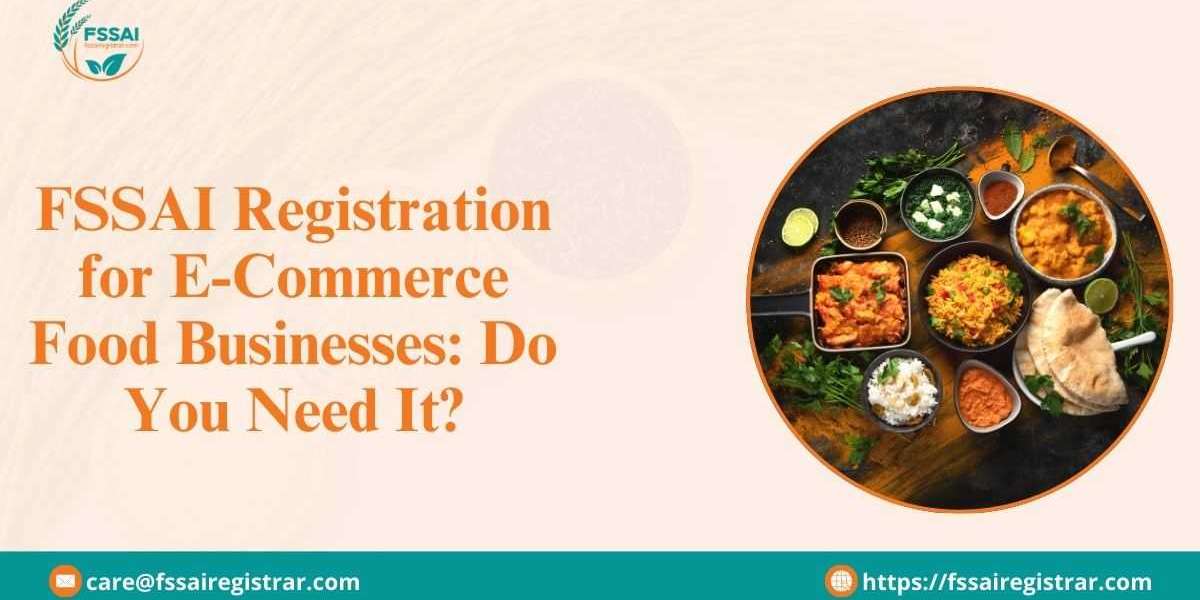Introduction
As the e-commerce landscape rapidly evolves, more entrepreneurs are turning to online platforms to sell food products. Whether it’s handcrafted baked goods, gourmet meal kits, organic snacks, or traditional delicacies, e-commerce has made it easier than ever to reach customers far and wide. But with this convenience comes responsibility, particularly when it comes to food safety. For any e-commerce food business operating in India, one crucial question often arises: Do you need FSSAI registration? The short answer is yes. Under the Food Safety and Standards Authority of India (FSSAI), any entity involved in the manufacturing, processing, distribution, or sale of food products—whether online or offline—is required to obtain FSSAI Registration or a license. This requirement applies to a wide range of e-commerce food businesses, from home chefs selling through social media platforms to large-scale operations using dedicated online stores or marketplaces. Let’s explore why this registration is necessary, who it applies to, and how it benefits your business in the long run.
Understanding FSSAI Registration
The FSSAI is the regulatory body responsible for ensuring food safety, quality, and hygiene across India. By requiring all food-related businesses to register, the FSSAI helps maintain a standardized framework that protects consumers and promotes transparency in the food supply chain. Businesses must comply with strict guidelines related to food preparation, packaging, labeling, and storage, ensuring that customers receive safe, high-quality products.
FSSAI registration typically comes in three forms, depending on the size and scale of the business:
- Basic Registration: For small-scale food businesses with an annual turnover of less than ₹12 lakh. This category often applies to startups, home-based sellers, and small e-commerce ventures.
- State License: For medium-sized food businesses with a turnover between ₹12 lakh and ₹20 crore or those operating within a single state.
- Central License: For larger food businesses with a turnover exceeding ₹20 crore or those selling across multiple states, including online platforms that deliver nationwide.
Who Must Register?
Any e-commerce food business, regardless of its size, must have FSSAI registration or a license. This includes:
- Home-Based Food Sellers: If you’re making snacks, baked goods, or packaged foods at home and selling them through your website or social media, you need at least a basic FSSAI registration.
- Online Retailers and Marketplaces: Platforms that sell or deliver food products—whether they’re selling under their brand name or acting as a marketplace for multiple vendors—must have the appropriate FSSAI license.
- Cloud Kitchens and Delivery Services: Businesses that prepare meals in delivery-only kitchens and send them directly to customers also fall under FSSAI regulations.
- Specialty Food Stores: E-commerce stores that sell imported goods, organic products, or health-focused items must also comply, as they are part of the food supply chain.
How to Obtain FSSAI Registration
1. Access the Official Portal:
Navigate to the official FSSAI registration website through your browser.
2. Complete the Application Form:
Fill out the required details, including your name, business information, and the food category you deal with. Be sure to upload your PAN card as well.
3. Review and Submit:
Carefully review all the entered information. Once verified, submit your application.
4. Make the Payment:
Proceed to pay the fee online. The amount will depend on the type of license you are applying for.
5. Verify Using OTP:
You will receive an OTP on your registered mobile or email. Enter it to confirm your application.
6. Undergo Inspection (If Needed):
An inspection may be conducted at your premises by FSSAI officials.
7. Download Your FSSAI License:
Once your application is approved, log back into the website and download your FSSAI license certificate.
Why E-Commerce Food Businesses Need FSSAI Registration
Legal Compliance:
Operating without an FSSAI registration is considered a violation of the Food Safety and Standards Act. Regulatory authorities can impose fines, and penalties, and even shut down operations if businesses fail to comply. Having the appropriate registration ensures that your e-commerce food business operates within the legal framework, giving you peace of mind and protection against potential legal issues.
Customer Trust and Credibility:
In the digital world, trust is a valuable currency. Customers are more likely to purchase from e-commerce food businesses that display their FSSAI license number on product pages, packaging, and promotional materials. This transparency reassures buyers that your products meet strict safety and quality standards. Over time, this trust translates into better customer retention, more positive reviews, and increased sales.
Access to Online Marketplaces:
Many e-commerce platforms and food delivery aggregators require vendors to have FSSAI registration before allowing them to sell on their platforms. If you plan to list your products on major marketplaces, such as Amazon, Flipkart, or Swiggy, you’ll likely need an FSSAI license to meet their eligibility criteria. Without it, you may lose access to these lucrative sales channels.
Facilitating Business Growth:
FSSAI registration isn’t just about compliance—it’s a stepping stone for expansion. With a valid license, you can explore new distribution channels, partner with larger retailers, and even export your products to other countries. Being registered also makes it easier to obtain additional certifications, such as organic or gluten-free labels, further boosting your credibility and market reach.
Improved Product Quality and Hygiene Standards:
The FSSAI registration process requires businesses to follow established guidelines for food preparation, storage, and packaging. By adhering to these standards, you ensure that your products maintain consistent quality and hygiene. This reduces the risk of foodborne illnesses, contamination, and recalls—ultimately protecting both your customers and your brand reputation.
Note: Complete your renewal food license in a few simple steps.
Conclusion
For e-commerce food businesses, FSSAI registration is not just a legal requirement—it’s a vital component of running a credible, trustworthy, and successful operation. By obtaining and displaying your FSSAI license, you demonstrate a commitment to quality, gain access to a wider range of sales platforms, and build confidence among your customers. In today’s competitive online marketplace, where reputation and transparency matter more than ever, FSSAI registration is a necessary step to ensure long-term growth, stability, and success.



